Small-Medium Enterprises' Responsibilities and Activity Based Costing
VerifiedAdded on 2023/06/14
|11
|2604
|337
Thesis and Dissertation
AI Summary
This thesis examines the responsibilities of Small-Medium Enterprises (SMEs) in relation to Activity Based Costing (ABC) and Traditional Cost Accounting (TCA). It investigates the effectiveness and limitations of both costing methods within SMEs, aiming to identify strategies for minimizing limitations associated with ABC implementation. The research employs a deductive approach, utilizing secondary data from books, journals, and websites, supplemented by a primary survey of ten SMEs. The study analyzes the potential of ABC to support SMEs in achieving competitiveness in the international economy and proposes a framework for future investigations, comparing ABC implementation across various SME types and industries. Ultimately, the research seeks to provide insights into the factors influencing ABC implementation and its outcomes in SMEs, contributing to the development of an efficient model for future studies.
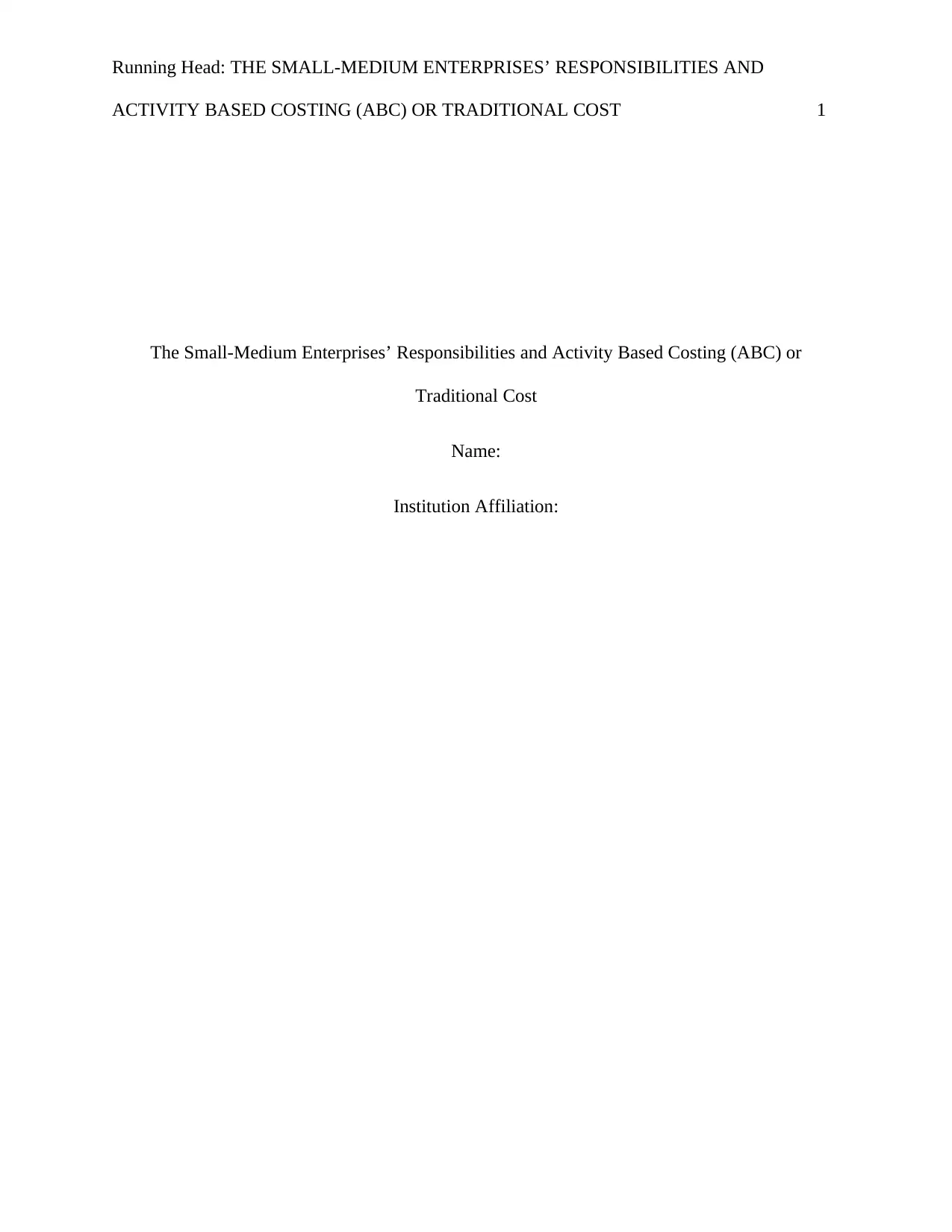
Running Head: THE SMALL-MEDIUM ENTERPRISES’ RESPONSIBILITIES AND
ACTIVITY BASED COSTING (ABC) OR TRADITIONAL COST 1
The Small-Medium Enterprises’ Responsibilities and Activity Based Costing (ABC) or
Traditional Cost
Name:
Institution Affiliation:
ACTIVITY BASED COSTING (ABC) OR TRADITIONAL COST 1
The Small-Medium Enterprises’ Responsibilities and Activity Based Costing (ABC) or
Traditional Cost
Name:
Institution Affiliation:
Paraphrase This Document
Need a fresh take? Get an instant paraphrase of this document with our AI Paraphraser
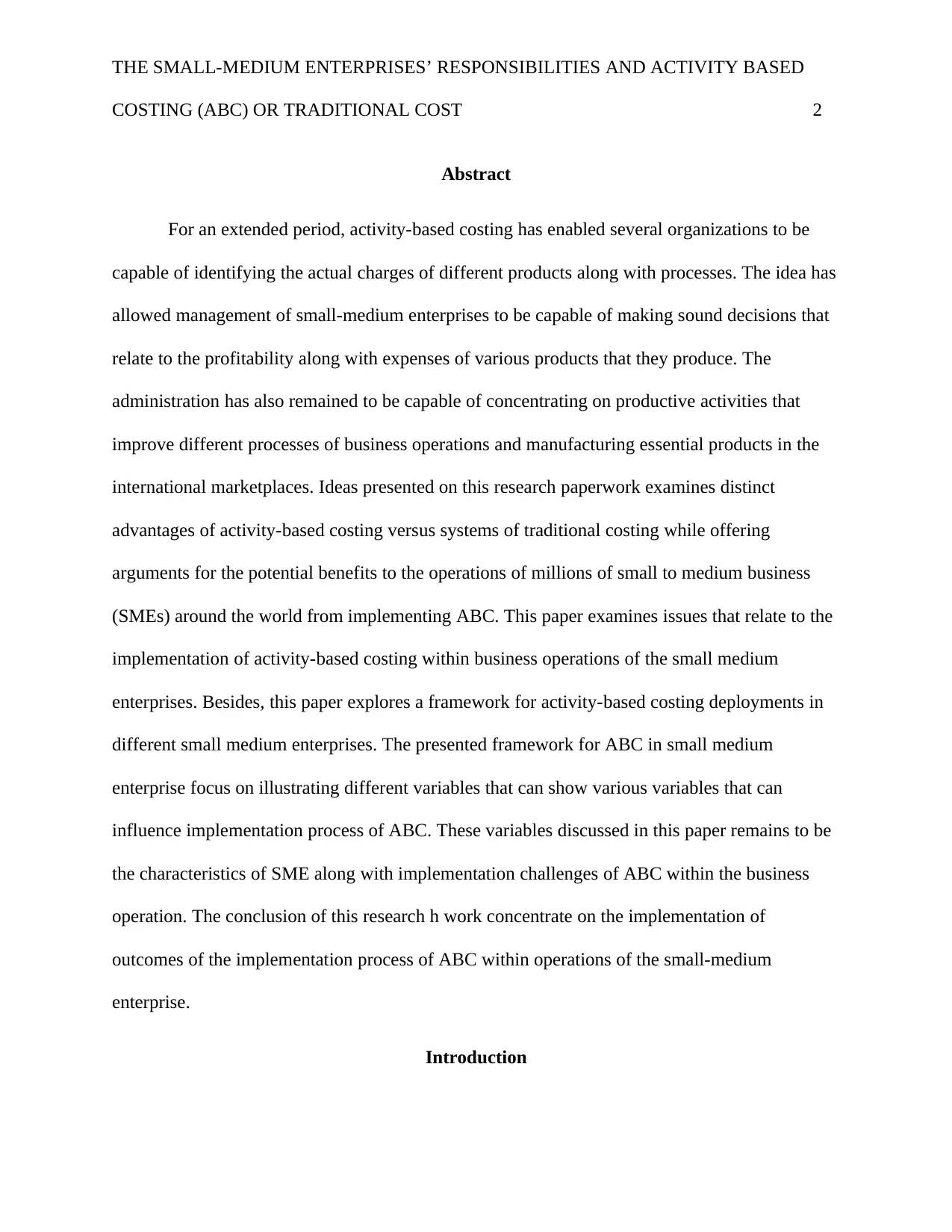
THE SMALL-MEDIUM ENTERPRISES’ RESPONSIBILITIES AND ACTIVITY BASED
COSTING (ABC) OR TRADITIONAL COST 2
Abstract
For an extended period, activity-based costing has enabled several organizations to be
capable of identifying the actual charges of different products along with processes. The idea has
allowed management of small-medium enterprises to be capable of making sound decisions that
relate to the profitability along with expenses of various products that they produce. The
administration has also remained to be capable of concentrating on productive activities that
improve different processes of business operations and manufacturing essential products in the
international marketplaces. Ideas presented on this research paperwork examines distinct
advantages of activity-based costing versus systems of traditional costing while offering
arguments for the potential benefits to the operations of millions of small to medium business
(SMEs) around the world from implementing ABC. This paper examines issues that relate to the
implementation of activity-based costing within business operations of the small medium
enterprises. Besides, this paper explores a framework for activity-based costing deployments in
different small medium enterprises. The presented framework for ABC in small medium
enterprise focus on illustrating different variables that can show various variables that can
influence implementation process of ABC. These variables discussed in this paper remains to be
the characteristics of SME along with implementation challenges of ABC within the business
operation. The conclusion of this research h work concentrate on the implementation of
outcomes of the implementation process of ABC within operations of the small-medium
enterprise.
Introduction
COSTING (ABC) OR TRADITIONAL COST 2
Abstract
For an extended period, activity-based costing has enabled several organizations to be
capable of identifying the actual charges of different products along with processes. The idea has
allowed management of small-medium enterprises to be capable of making sound decisions that
relate to the profitability along with expenses of various products that they produce. The
administration has also remained to be capable of concentrating on productive activities that
improve different processes of business operations and manufacturing essential products in the
international marketplaces. Ideas presented on this research paperwork examines distinct
advantages of activity-based costing versus systems of traditional costing while offering
arguments for the potential benefits to the operations of millions of small to medium business
(SMEs) around the world from implementing ABC. This paper examines issues that relate to the
implementation of activity-based costing within business operations of the small medium
enterprises. Besides, this paper explores a framework for activity-based costing deployments in
different small medium enterprises. The presented framework for ABC in small medium
enterprise focus on illustrating different variables that can show various variables that can
influence implementation process of ABC. These variables discussed in this paper remains to be
the characteristics of SME along with implementation challenges of ABC within the business
operation. The conclusion of this research h work concentrate on the implementation of
outcomes of the implementation process of ABC within operations of the small-medium
enterprise.
Introduction
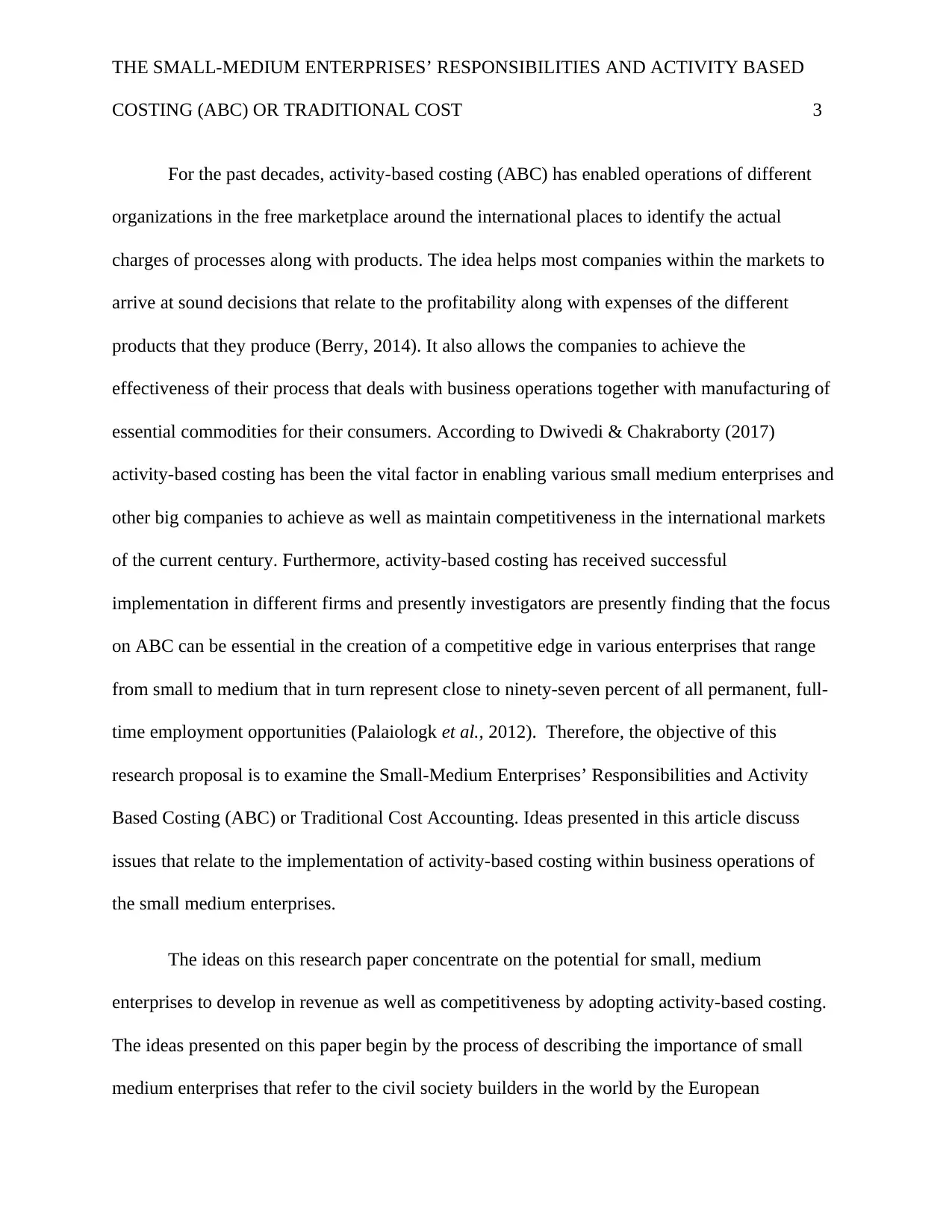
THE SMALL-MEDIUM ENTERPRISES’ RESPONSIBILITIES AND ACTIVITY BASED
COSTING (ABC) OR TRADITIONAL COST 3
For the past decades, activity-based costing (ABC) has enabled operations of different
organizations in the free marketplace around the international places to identify the actual
charges of processes along with products. The idea helps most companies within the markets to
arrive at sound decisions that relate to the profitability along with expenses of the different
products that they produce (Berry, 2014). It also allows the companies to achieve the
effectiveness of their process that deals with business operations together with manufacturing of
essential commodities for their consumers. According to Dwivedi & Chakraborty (2017)
activity-based costing has been the vital factor in enabling various small medium enterprises and
other big companies to achieve as well as maintain competitiveness in the international markets
of the current century. Furthermore, activity-based costing has received successful
implementation in different firms and presently investigators are presently finding that the focus
on ABC can be essential in the creation of a competitive edge in various enterprises that range
from small to medium that in turn represent close to ninety-seven percent of all permanent, full-
time employment opportunities (Palaiologk et al., 2012). Therefore, the objective of this
research proposal is to examine the Small-Medium Enterprises’ Responsibilities and Activity
Based Costing (ABC) or Traditional Cost Accounting. Ideas presented in this article discuss
issues that relate to the implementation of activity-based costing within business operations of
the small medium enterprises.
The ideas on this research paper concentrate on the potential for small, medium
enterprises to develop in revenue as well as competitiveness by adopting activity-based costing.
The ideas presented on this paper begin by the process of describing the importance of small
medium enterprises that refer to the civil society builders in the world by the European
COSTING (ABC) OR TRADITIONAL COST 3
For the past decades, activity-based costing (ABC) has enabled operations of different
organizations in the free marketplace around the international places to identify the actual
charges of processes along with products. The idea helps most companies within the markets to
arrive at sound decisions that relate to the profitability along with expenses of the different
products that they produce (Berry, 2014). It also allows the companies to achieve the
effectiveness of their process that deals with business operations together with manufacturing of
essential commodities for their consumers. According to Dwivedi & Chakraborty (2017)
activity-based costing has been the vital factor in enabling various small medium enterprises and
other big companies to achieve as well as maintain competitiveness in the international markets
of the current century. Furthermore, activity-based costing has received successful
implementation in different firms and presently investigators are presently finding that the focus
on ABC can be essential in the creation of a competitive edge in various enterprises that range
from small to medium that in turn represent close to ninety-seven percent of all permanent, full-
time employment opportunities (Palaiologk et al., 2012). Therefore, the objective of this
research proposal is to examine the Small-Medium Enterprises’ Responsibilities and Activity
Based Costing (ABC) or Traditional Cost Accounting. Ideas presented in this article discuss
issues that relate to the implementation of activity-based costing within business operations of
the small medium enterprises.
The ideas on this research paper concentrate on the potential for small, medium
enterprises to develop in revenue as well as competitiveness by adopting activity-based costing.
The ideas presented on this paper begin by the process of describing the importance of small
medium enterprises that refer to the civil society builders in the world by the European
⊘ This is a preview!⊘
Do you want full access?
Subscribe today to unlock all pages.

Trusted by 1+ million students worldwide
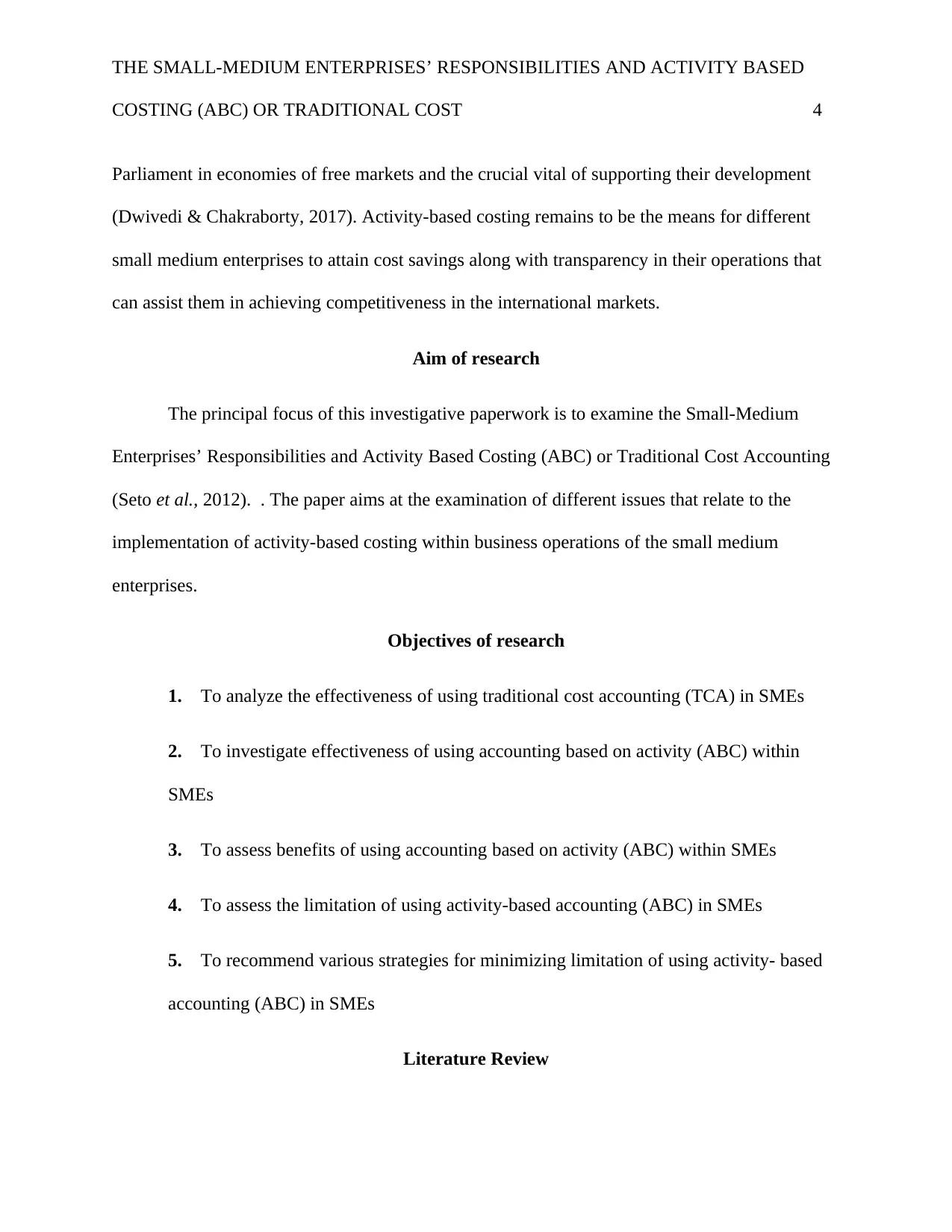
THE SMALL-MEDIUM ENTERPRISES’ RESPONSIBILITIES AND ACTIVITY BASED
COSTING (ABC) OR TRADITIONAL COST 4
Parliament in economies of free markets and the crucial vital of supporting their development
(Dwivedi & Chakraborty, 2017). Activity-based costing remains to be the means for different
small medium enterprises to attain cost savings along with transparency in their operations that
can assist them in achieving competitiveness in the international markets.
Aim of research
The principal focus of this investigative paperwork is to examine the Small-Medium
Enterprises’ Responsibilities and Activity Based Costing (ABC) or Traditional Cost Accounting
(Seto et al., 2012). . The paper aims at the examination of different issues that relate to the
implementation of activity-based costing within business operations of the small medium
enterprises.
Objectives of research
1. To analyze the effectiveness of using traditional cost accounting (TCA) in SMEs
2. To investigate effectiveness of using accounting based on activity (ABC) within
SMEs
3. To assess benefits of using accounting based on activity (ABC) within SMEs
4. To assess the limitation of using activity-based accounting (ABC) in SMEs
5. To recommend various strategies for minimizing limitation of using activity- based
accounting (ABC) in SMEs
Literature Review
COSTING (ABC) OR TRADITIONAL COST 4
Parliament in economies of free markets and the crucial vital of supporting their development
(Dwivedi & Chakraborty, 2017). Activity-based costing remains to be the means for different
small medium enterprises to attain cost savings along with transparency in their operations that
can assist them in achieving competitiveness in the international markets.
Aim of research
The principal focus of this investigative paperwork is to examine the Small-Medium
Enterprises’ Responsibilities and Activity Based Costing (ABC) or Traditional Cost Accounting
(Seto et al., 2012). . The paper aims at the examination of different issues that relate to the
implementation of activity-based costing within business operations of the small medium
enterprises.
Objectives of research
1. To analyze the effectiveness of using traditional cost accounting (TCA) in SMEs
2. To investigate effectiveness of using accounting based on activity (ABC) within
SMEs
3. To assess benefits of using accounting based on activity (ABC) within SMEs
4. To assess the limitation of using activity-based accounting (ABC) in SMEs
5. To recommend various strategies for minimizing limitation of using activity- based
accounting (ABC) in SMEs
Literature Review
Paraphrase This Document
Need a fresh take? Get an instant paraphrase of this document with our AI Paraphraser
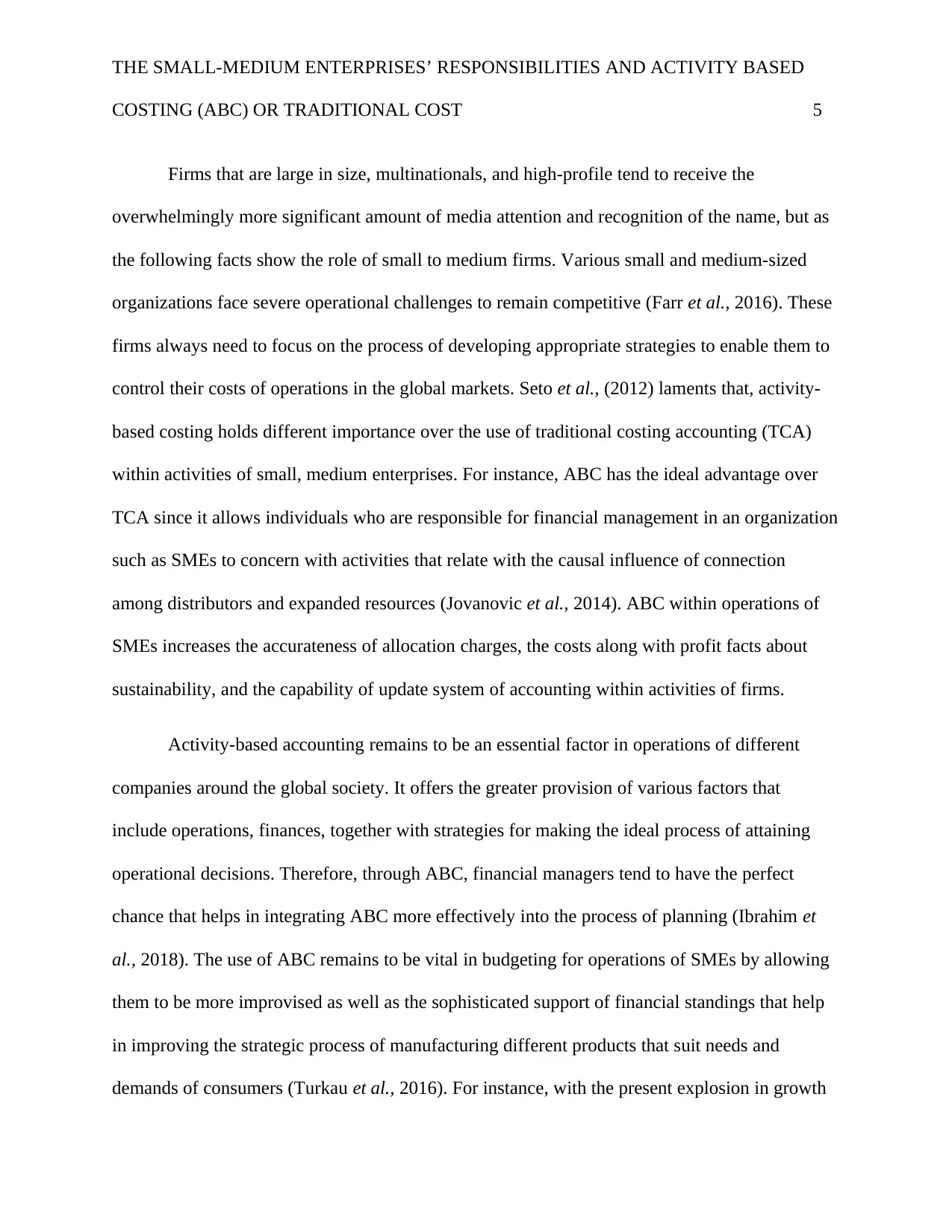
THE SMALL-MEDIUM ENTERPRISES’ RESPONSIBILITIES AND ACTIVITY BASED
COSTING (ABC) OR TRADITIONAL COST 5
Firms that are large in size, multinationals, and high-profile tend to receive the
overwhelmingly more significant amount of media attention and recognition of the name, but as
the following facts show the role of small to medium firms. Various small and medium-sized
organizations face severe operational challenges to remain competitive (Farr et al., 2016). These
firms always need to focus on the process of developing appropriate strategies to enable them to
control their costs of operations in the global markets. Seto et al., (2012) laments that, activity-
based costing holds different importance over the use of traditional costing accounting (TCA)
within activities of small, medium enterprises. For instance, ABC has the ideal advantage over
TCA since it allows individuals who are responsible for financial management in an organization
such as SMEs to concern with activities that relate with the causal influence of connection
among distributors and expanded resources (Jovanovic et al., 2014). ABC within operations of
SMEs increases the accurateness of allocation charges, the costs along with profit facts about
sustainability, and the capability of update system of accounting within activities of firms.
Activity-based accounting remains to be an essential factor in operations of different
companies around the global society. It offers the greater provision of various factors that
include operations, finances, together with strategies for making the ideal process of attaining
operational decisions. Therefore, through ABC, financial managers tend to have the perfect
chance that helps in integrating ABC more effectively into the process of planning (Ibrahim et
al., 2018). The use of ABC remains to be vital in budgeting for operations of SMEs by allowing
them to be more improvised as well as the sophisticated support of financial standings that help
in improving the strategic process of manufacturing different products that suit needs and
demands of consumers (Turkau et al., 2016). For instance, with the present explosion in growth
COSTING (ABC) OR TRADITIONAL COST 5
Firms that are large in size, multinationals, and high-profile tend to receive the
overwhelmingly more significant amount of media attention and recognition of the name, but as
the following facts show the role of small to medium firms. Various small and medium-sized
organizations face severe operational challenges to remain competitive (Farr et al., 2016). These
firms always need to focus on the process of developing appropriate strategies to enable them to
control their costs of operations in the global markets. Seto et al., (2012) laments that, activity-
based costing holds different importance over the use of traditional costing accounting (TCA)
within activities of small, medium enterprises. For instance, ABC has the ideal advantage over
TCA since it allows individuals who are responsible for financial management in an organization
such as SMEs to concern with activities that relate with the causal influence of connection
among distributors and expanded resources (Jovanovic et al., 2014). ABC within operations of
SMEs increases the accurateness of allocation charges, the costs along with profit facts about
sustainability, and the capability of update system of accounting within activities of firms.
Activity-based accounting remains to be an essential factor in operations of different
companies around the global society. It offers the greater provision of various factors that
include operations, finances, together with strategies for making the ideal process of attaining
operational decisions. Therefore, through ABC, financial managers tend to have the perfect
chance that helps in integrating ABC more effectively into the process of planning (Ibrahim et
al., 2018). The use of ABC remains to be vital in budgeting for operations of SMEs by allowing
them to be more improvised as well as the sophisticated support of financial standings that help
in improving the strategic process of manufacturing different products that suit needs and
demands of consumers (Turkau et al., 2016). For instance, with the present explosion in growth
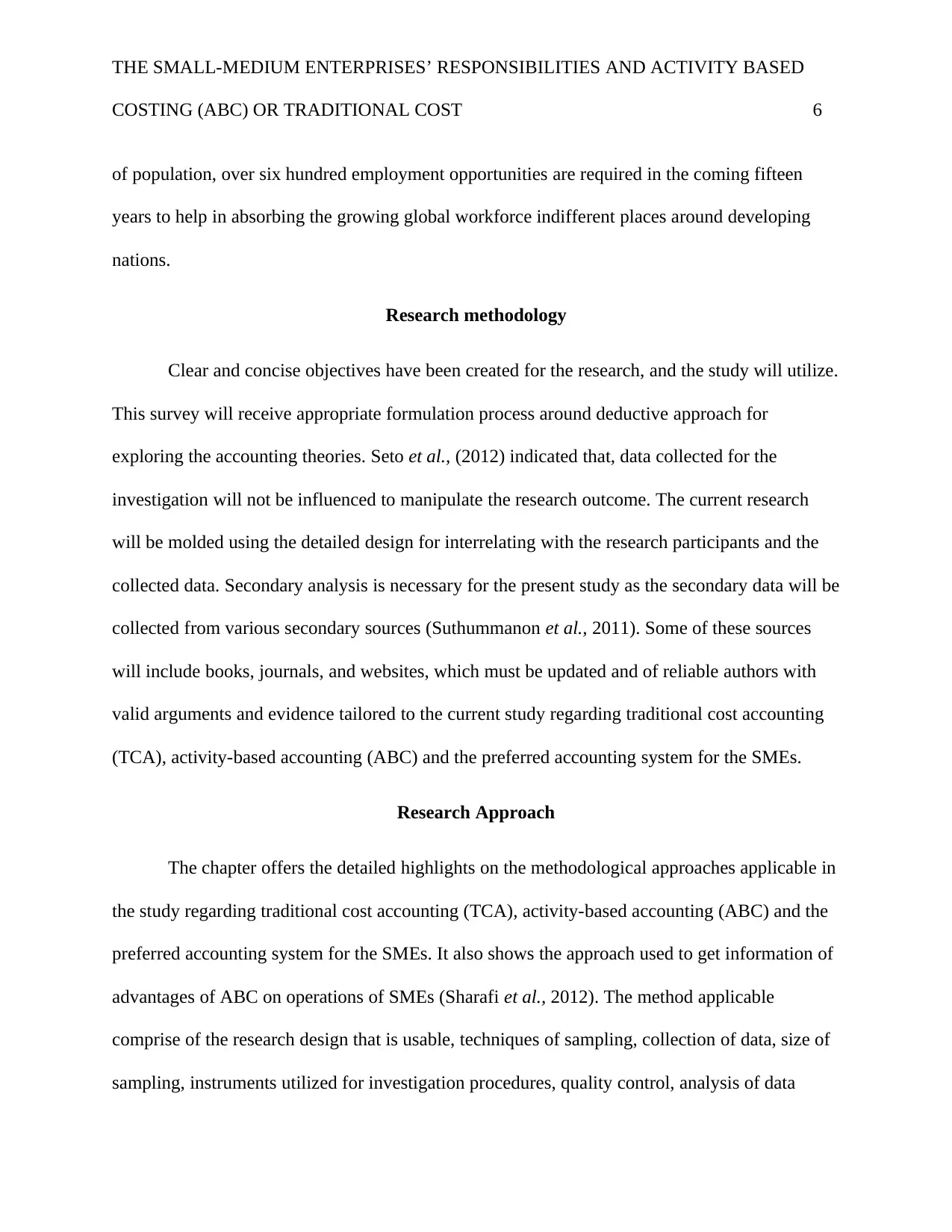
THE SMALL-MEDIUM ENTERPRISES’ RESPONSIBILITIES AND ACTIVITY BASED
COSTING (ABC) OR TRADITIONAL COST 6
of population, over six hundred employment opportunities are required in the coming fifteen
years to help in absorbing the growing global workforce indifferent places around developing
nations.
Research methodology
Clear and concise objectives have been created for the research, and the study will utilize.
This survey will receive appropriate formulation process around deductive approach for
exploring the accounting theories. Seto et al., (2012) indicated that, data collected for the
investigation will not be influenced to manipulate the research outcome. The current research
will be molded using the detailed design for interrelating with the research participants and the
collected data. Secondary analysis is necessary for the present study as the secondary data will be
collected from various secondary sources (Suthummanon et al., 2011). Some of these sources
will include books, journals, and websites, which must be updated and of reliable authors with
valid arguments and evidence tailored to the current study regarding traditional cost accounting
(TCA), activity-based accounting (ABC) and the preferred accounting system for the SMEs.
Research Approach
The chapter offers the detailed highlights on the methodological approaches applicable in
the study regarding traditional cost accounting (TCA), activity-based accounting (ABC) and the
preferred accounting system for the SMEs. It also shows the approach used to get information of
advantages of ABC on operations of SMEs (Sharafi et al., 2012). The method applicable
comprise of the research design that is usable, techniques of sampling, collection of data, size of
sampling, instruments utilized for investigation procedures, quality control, analysis of data
COSTING (ABC) OR TRADITIONAL COST 6
of population, over six hundred employment opportunities are required in the coming fifteen
years to help in absorbing the growing global workforce indifferent places around developing
nations.
Research methodology
Clear and concise objectives have been created for the research, and the study will utilize.
This survey will receive appropriate formulation process around deductive approach for
exploring the accounting theories. Seto et al., (2012) indicated that, data collected for the
investigation will not be influenced to manipulate the research outcome. The current research
will be molded using the detailed design for interrelating with the research participants and the
collected data. Secondary analysis is necessary for the present study as the secondary data will be
collected from various secondary sources (Suthummanon et al., 2011). Some of these sources
will include books, journals, and websites, which must be updated and of reliable authors with
valid arguments and evidence tailored to the current study regarding traditional cost accounting
(TCA), activity-based accounting (ABC) and the preferred accounting system for the SMEs.
Research Approach
The chapter offers the detailed highlights on the methodological approaches applicable in
the study regarding traditional cost accounting (TCA), activity-based accounting (ABC) and the
preferred accounting system for the SMEs. It also shows the approach used to get information of
advantages of ABC on operations of SMEs (Sharafi et al., 2012). The method applicable
comprise of the research design that is usable, techniques of sampling, collection of data, size of
sampling, instruments utilized for investigation procedures, quality control, analysis of data
⊘ This is a preview!⊘
Do you want full access?
Subscribe today to unlock all pages.

Trusted by 1+ million students worldwide
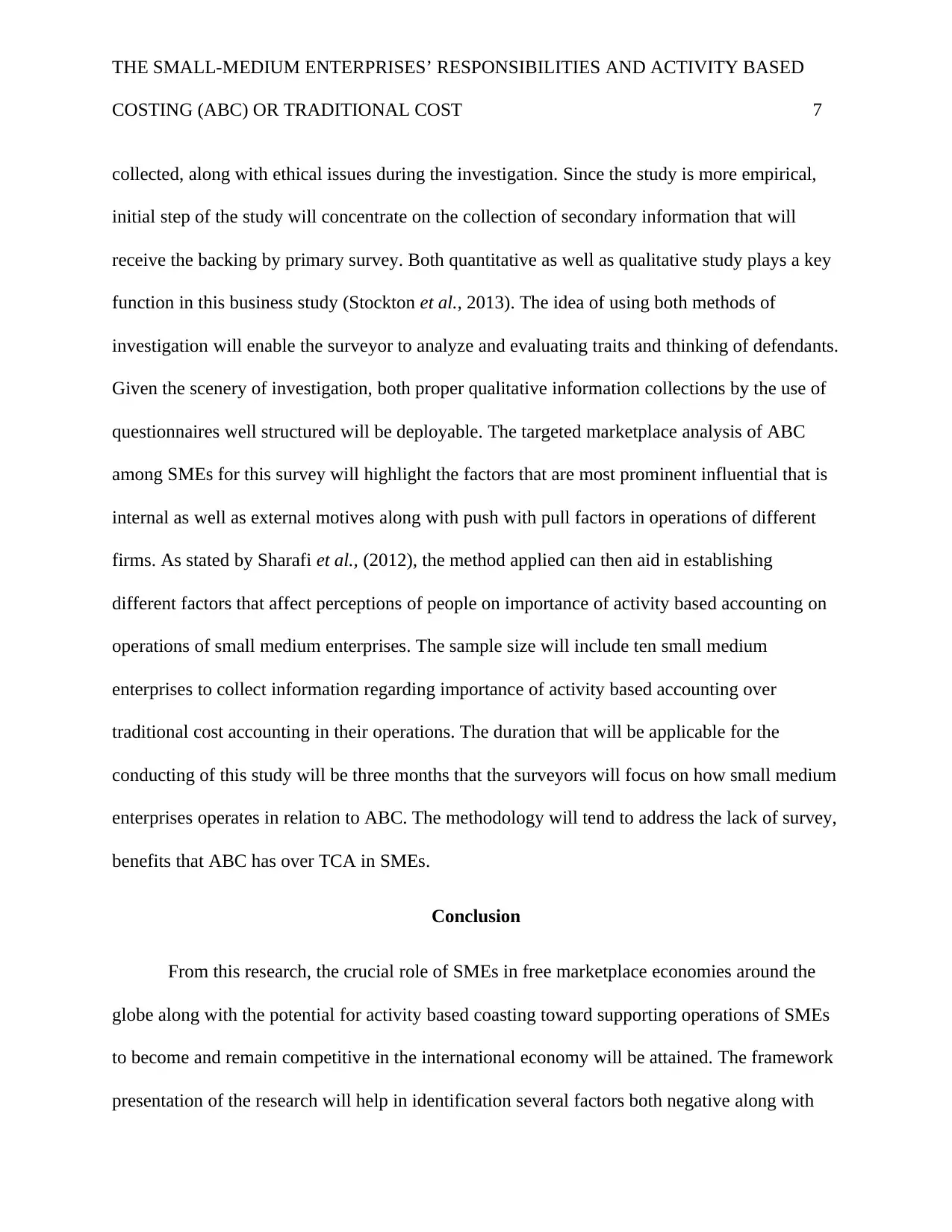
THE SMALL-MEDIUM ENTERPRISES’ RESPONSIBILITIES AND ACTIVITY BASED
COSTING (ABC) OR TRADITIONAL COST 7
collected, along with ethical issues during the investigation. Since the study is more empirical,
initial step of the study will concentrate on the collection of secondary information that will
receive the backing by primary survey. Both quantitative as well as qualitative study plays a key
function in this business study (Stockton et al., 2013). The idea of using both methods of
investigation will enable the surveyor to analyze and evaluating traits and thinking of defendants.
Given the scenery of investigation, both proper qualitative information collections by the use of
questionnaires well structured will be deployable. The targeted marketplace analysis of ABC
among SMEs for this survey will highlight the factors that are most prominent influential that is
internal as well as external motives along with push with pull factors in operations of different
firms. As stated by Sharafi et al., (2012), the method applied can then aid in establishing
different factors that affect perceptions of people on importance of activity based accounting on
operations of small medium enterprises. The sample size will include ten small medium
enterprises to collect information regarding importance of activity based accounting over
traditional cost accounting in their operations. The duration that will be applicable for the
conducting of this study will be three months that the surveyors will focus on how small medium
enterprises operates in relation to ABC. The methodology will tend to address the lack of survey,
benefits that ABC has over TCA in SMEs.
Conclusion
From this research, the crucial role of SMEs in free marketplace economies around the
globe along with the potential for activity based coasting toward supporting operations of SMEs
to become and remain competitive in the international economy will be attained. The framework
presentation of the research will help in identification several factors both negative along with
COSTING (ABC) OR TRADITIONAL COST 7
collected, along with ethical issues during the investigation. Since the study is more empirical,
initial step of the study will concentrate on the collection of secondary information that will
receive the backing by primary survey. Both quantitative as well as qualitative study plays a key
function in this business study (Stockton et al., 2013). The idea of using both methods of
investigation will enable the surveyor to analyze and evaluating traits and thinking of defendants.
Given the scenery of investigation, both proper qualitative information collections by the use of
questionnaires well structured will be deployable. The targeted marketplace analysis of ABC
among SMEs for this survey will highlight the factors that are most prominent influential that is
internal as well as external motives along with push with pull factors in operations of different
firms. As stated by Sharafi et al., (2012), the method applied can then aid in establishing
different factors that affect perceptions of people on importance of activity based accounting on
operations of small medium enterprises. The sample size will include ten small medium
enterprises to collect information regarding importance of activity based accounting over
traditional cost accounting in their operations. The duration that will be applicable for the
conducting of this study will be three months that the surveyors will focus on how small medium
enterprises operates in relation to ABC. The methodology will tend to address the lack of survey,
benefits that ABC has over TCA in SMEs.
Conclusion
From this research, the crucial role of SMEs in free marketplace economies around the
globe along with the potential for activity based coasting toward supporting operations of SMEs
to become and remain competitive in the international economy will be attained. The framework
presentation of the research will help in identification several factors both negative along with
Paraphrase This Document
Need a fresh take? Get an instant paraphrase of this document with our AI Paraphraser
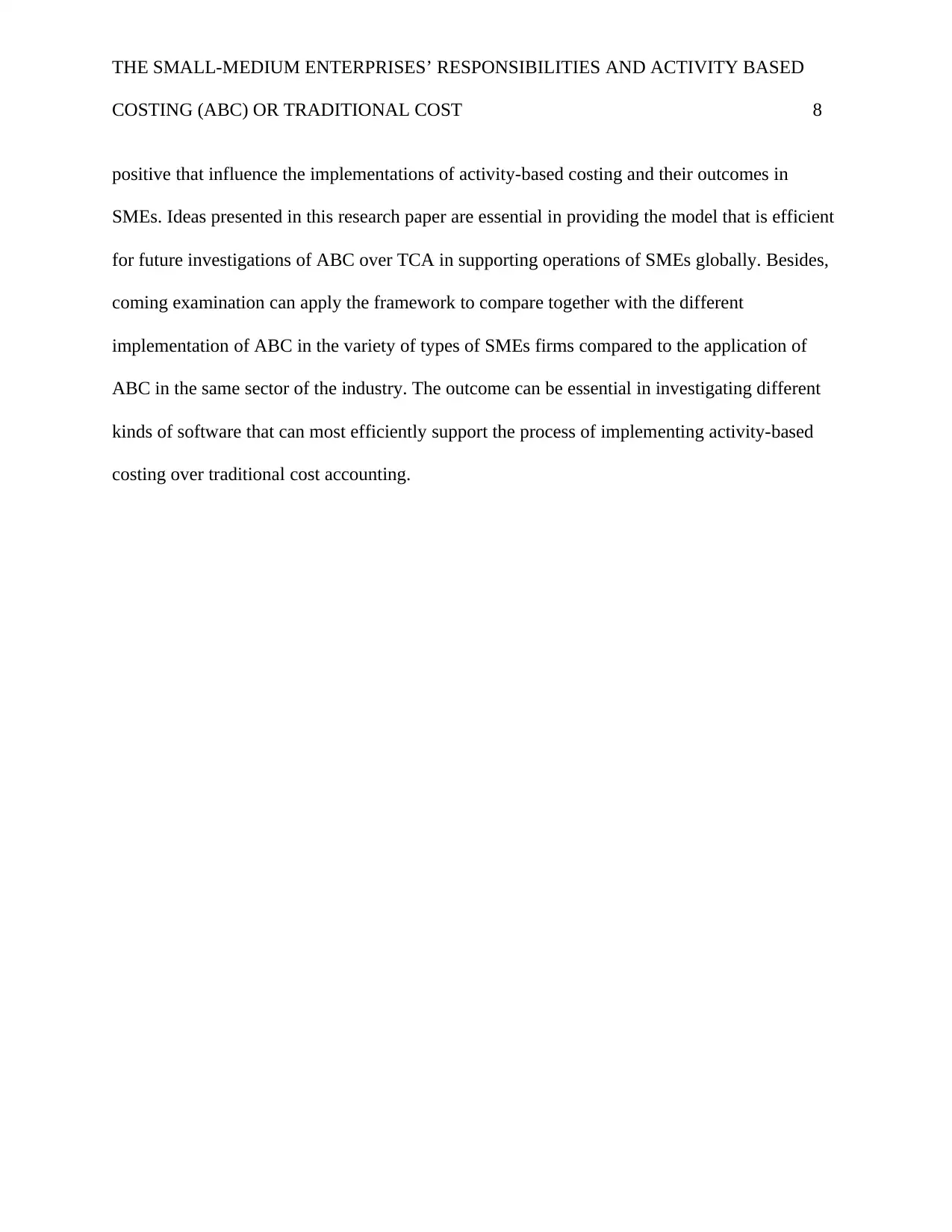
THE SMALL-MEDIUM ENTERPRISES’ RESPONSIBILITIES AND ACTIVITY BASED
COSTING (ABC) OR TRADITIONAL COST 8
positive that influence the implementations of activity-based costing and their outcomes in
SMEs. Ideas presented in this research paper are essential in providing the model that is efficient
for future investigations of ABC over TCA in supporting operations of SMEs globally. Besides,
coming examination can apply the framework to compare together with the different
implementation of ABC in the variety of types of SMEs firms compared to the application of
ABC in the same sector of the industry. The outcome can be essential in investigating different
kinds of software that can most efficiently support the process of implementing activity-based
costing over traditional cost accounting.
COSTING (ABC) OR TRADITIONAL COST 8
positive that influence the implementations of activity-based costing and their outcomes in
SMEs. Ideas presented in this research paper are essential in providing the model that is efficient
for future investigations of ABC over TCA in supporting operations of SMEs globally. Besides,
coming examination can apply the framework to compare together with the different
implementation of ABC in the variety of types of SMEs firms compared to the application of
ABC in the same sector of the industry. The outcome can be essential in investigating different
kinds of software that can most efficiently support the process of implementing activity-based
costing over traditional cost accounting.
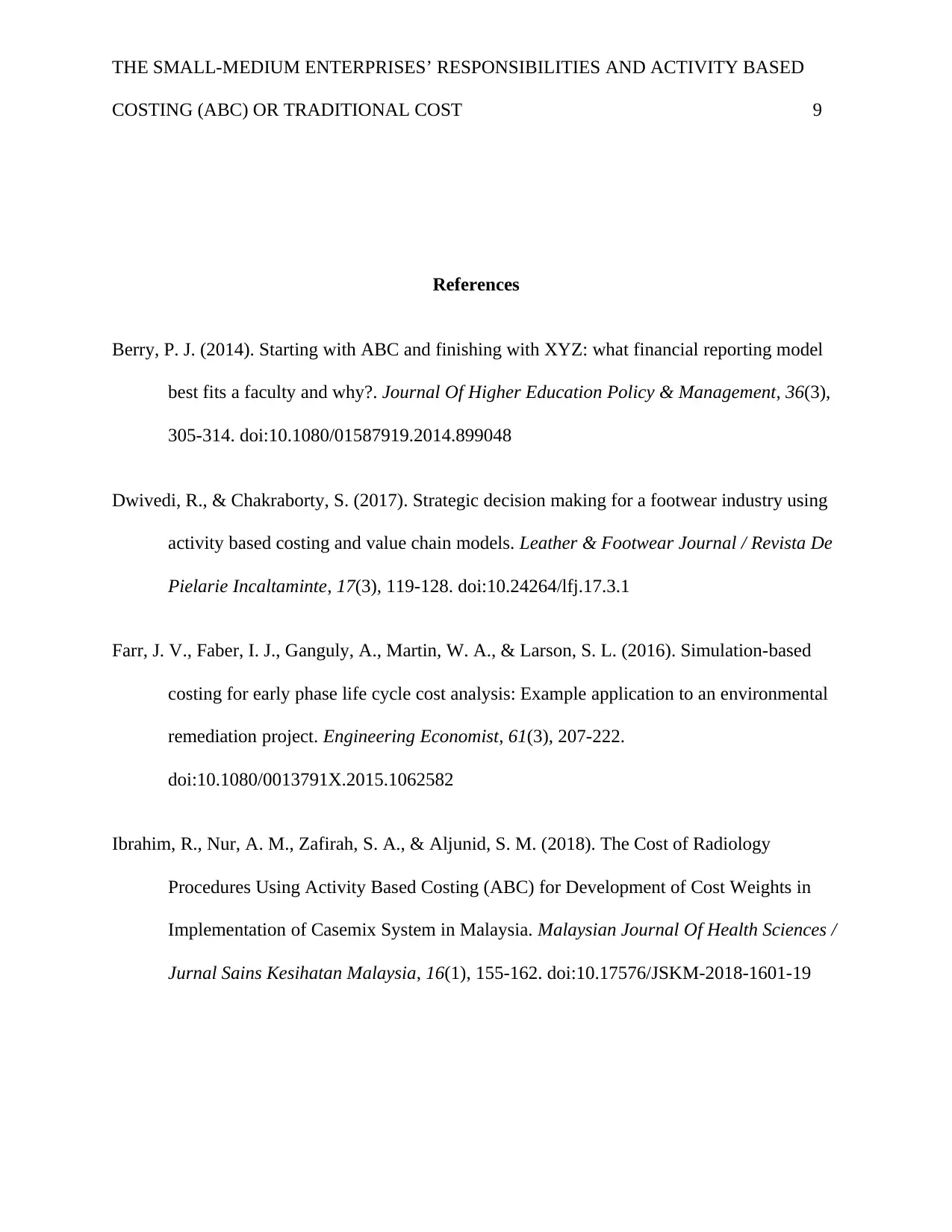
THE SMALL-MEDIUM ENTERPRISES’ RESPONSIBILITIES AND ACTIVITY BASED
COSTING (ABC) OR TRADITIONAL COST 9
References
Berry, P. J. (2014). Starting with ABC and finishing with XYZ: what financial reporting model
best fits a faculty and why?. Journal Of Higher Education Policy & Management, 36(3),
305-314. doi:10.1080/01587919.2014.899048
Dwivedi, R., & Chakraborty, S. (2017). Strategic decision making for a footwear industry using
activity based costing and value chain models. Leather & Footwear Journal / Revista De
Pielarie Incaltaminte, 17(3), 119-128. doi:10.24264/lfj.17.3.1
Farr, J. V., Faber, I. J., Ganguly, A., Martin, W. A., & Larson, S. L. (2016). Simulation-based
costing for early phase life cycle cost analysis: Example application to an environmental
remediation project. Engineering Economist, 61(3), 207-222.
doi:10.1080/0013791X.2015.1062582
Ibrahim, R., Nur, A. M., Zafirah, S. A., & Aljunid, S. M. (2018). The Cost of Radiology
Procedures Using Activity Based Costing (ABC) for Development of Cost Weights in
Implementation of Casemix System in Malaysia. Malaysian Journal Of Health Sciences /
Jurnal Sains Kesihatan Malaysia, 16(1), 155-162. doi:10.17576/JSKM-2018-1601-19
COSTING (ABC) OR TRADITIONAL COST 9
References
Berry, P. J. (2014). Starting with ABC and finishing with XYZ: what financial reporting model
best fits a faculty and why?. Journal Of Higher Education Policy & Management, 36(3),
305-314. doi:10.1080/01587919.2014.899048
Dwivedi, R., & Chakraborty, S. (2017). Strategic decision making for a footwear industry using
activity based costing and value chain models. Leather & Footwear Journal / Revista De
Pielarie Incaltaminte, 17(3), 119-128. doi:10.24264/lfj.17.3.1
Farr, J. V., Faber, I. J., Ganguly, A., Martin, W. A., & Larson, S. L. (2016). Simulation-based
costing for early phase life cycle cost analysis: Example application to an environmental
remediation project. Engineering Economist, 61(3), 207-222.
doi:10.1080/0013791X.2015.1062582
Ibrahim, R., Nur, A. M., Zafirah, S. A., & Aljunid, S. M. (2018). The Cost of Radiology
Procedures Using Activity Based Costing (ABC) for Development of Cost Weights in
Implementation of Casemix System in Malaysia. Malaysian Journal Of Health Sciences /
Jurnal Sains Kesihatan Malaysia, 16(1), 155-162. doi:10.17576/JSKM-2018-1601-19
⊘ This is a preview!⊘
Do you want full access?
Subscribe today to unlock all pages.

Trusted by 1+ million students worldwide
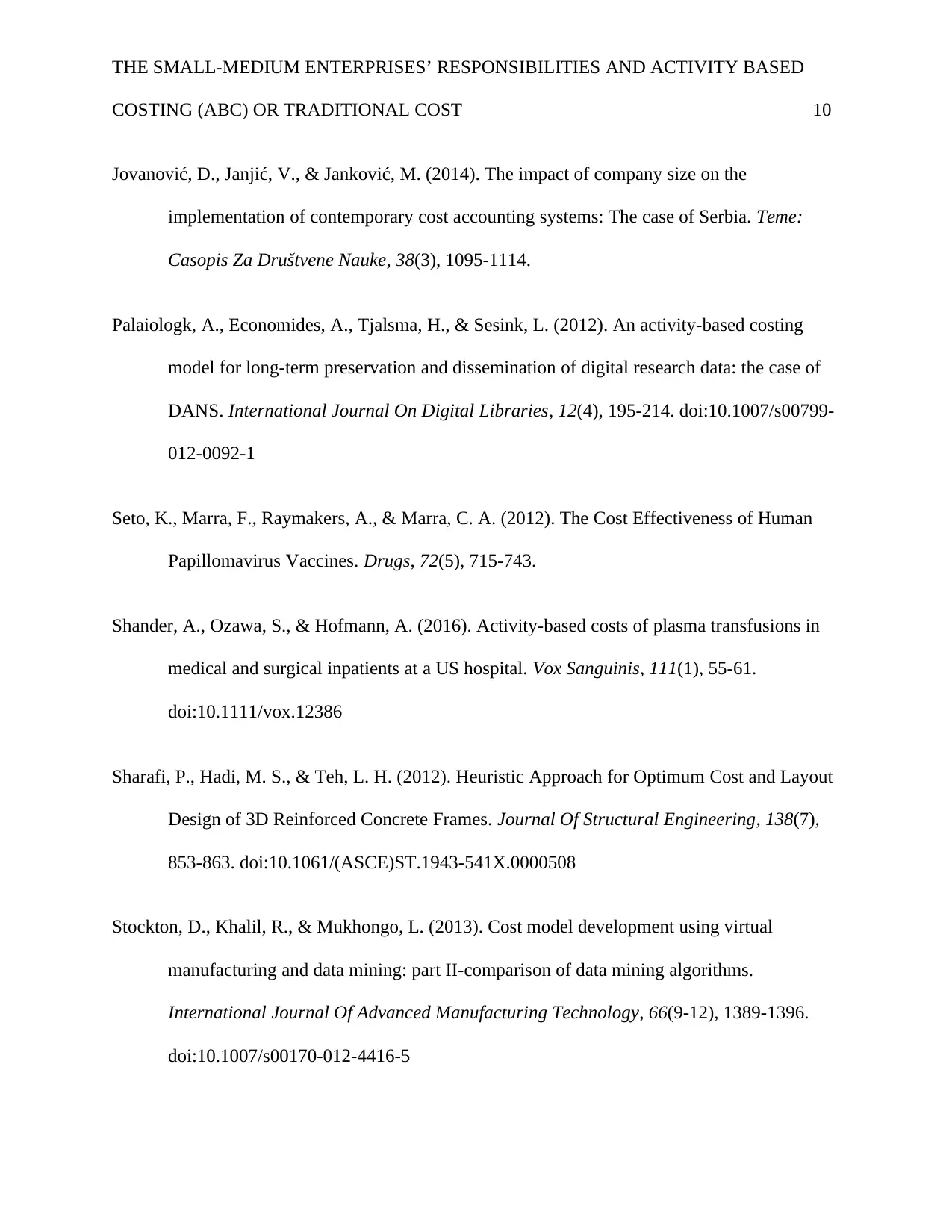
THE SMALL-MEDIUM ENTERPRISES’ RESPONSIBILITIES AND ACTIVITY BASED
COSTING (ABC) OR TRADITIONAL COST 10
Jovanović, D., Janjić, V., & Janković, M. (2014). The impact of company size on the
implementation of contemporary cost accounting systems: The case of Serbia. Teme:
Casopis Za Društvene Nauke, 38(3), 1095-1114.
Palaiologk, A., Economides, A., Tjalsma, H., & Sesink, L. (2012). An activity-based costing
model for long-term preservation and dissemination of digital research data: the case of
DANS. International Journal On Digital Libraries, 12(4), 195-214. doi:10.1007/s00799-
012-0092-1
Seto, K., Marra, F., Raymakers, A., & Marra, C. A. (2012). The Cost Effectiveness of Human
Papillomavirus Vaccines. Drugs, 72(5), 715-743.
Shander, A., Ozawa, S., & Hofmann, A. (2016). Activity-based costs of plasma transfusions in
medical and surgical inpatients at a US hospital. Vox Sanguinis, 111(1), 55-61.
doi:10.1111/vox.12386
Sharafi, P., Hadi, M. S., & Teh, L. H. (2012). Heuristic Approach for Optimum Cost and Layout
Design of 3D Reinforced Concrete Frames. Journal Of Structural Engineering, 138(7),
853-863. doi:10.1061/(ASCE)ST.1943-541X.0000508
Stockton, D., Khalil, R., & Mukhongo, L. (2013). Cost model development using virtual
manufacturing and data mining: part II-comparison of data mining algorithms.
International Journal Of Advanced Manufacturing Technology, 66(9-12), 1389-1396.
doi:10.1007/s00170-012-4416-5
COSTING (ABC) OR TRADITIONAL COST 10
Jovanović, D., Janjić, V., & Janković, M. (2014). The impact of company size on the
implementation of contemporary cost accounting systems: The case of Serbia. Teme:
Casopis Za Društvene Nauke, 38(3), 1095-1114.
Palaiologk, A., Economides, A., Tjalsma, H., & Sesink, L. (2012). An activity-based costing
model for long-term preservation and dissemination of digital research data: the case of
DANS. International Journal On Digital Libraries, 12(4), 195-214. doi:10.1007/s00799-
012-0092-1
Seto, K., Marra, F., Raymakers, A., & Marra, C. A. (2012). The Cost Effectiveness of Human
Papillomavirus Vaccines. Drugs, 72(5), 715-743.
Shander, A., Ozawa, S., & Hofmann, A. (2016). Activity-based costs of plasma transfusions in
medical and surgical inpatients at a US hospital. Vox Sanguinis, 111(1), 55-61.
doi:10.1111/vox.12386
Sharafi, P., Hadi, M. S., & Teh, L. H. (2012). Heuristic Approach for Optimum Cost and Layout
Design of 3D Reinforced Concrete Frames. Journal Of Structural Engineering, 138(7),
853-863. doi:10.1061/(ASCE)ST.1943-541X.0000508
Stockton, D., Khalil, R., & Mukhongo, L. (2013). Cost model development using virtual
manufacturing and data mining: part II-comparison of data mining algorithms.
International Journal Of Advanced Manufacturing Technology, 66(9-12), 1389-1396.
doi:10.1007/s00170-012-4416-5
Paraphrase This Document
Need a fresh take? Get an instant paraphrase of this document with our AI Paraphraser
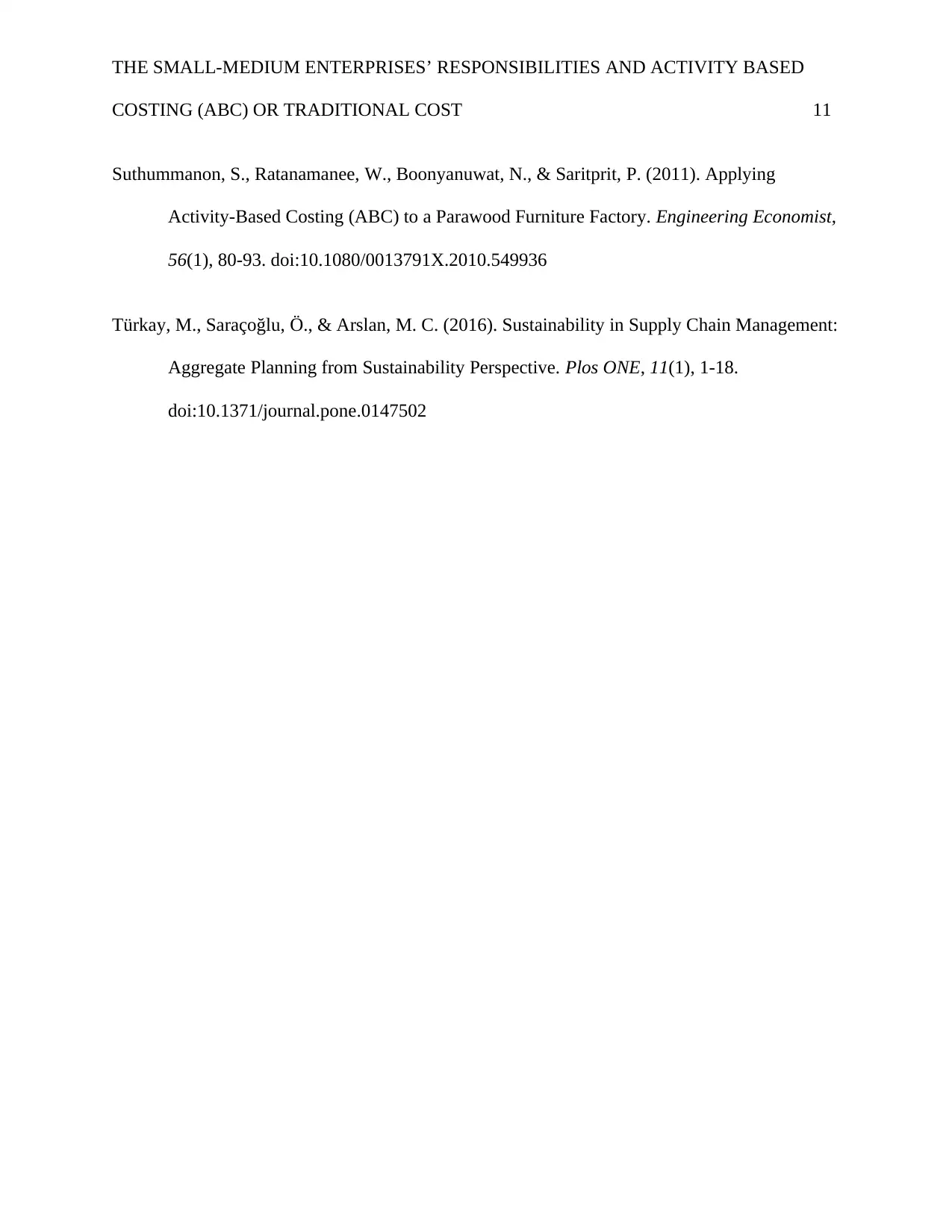
THE SMALL-MEDIUM ENTERPRISES’ RESPONSIBILITIES AND ACTIVITY BASED
COSTING (ABC) OR TRADITIONAL COST 11
Suthummanon, S., Ratanamanee, W., Boonyanuwat, N., & Saritprit, P. (2011). Applying
Activity-Based Costing (ABC) to a Parawood Furniture Factory. Engineering Economist,
56(1), 80-93. doi:10.1080/0013791X.2010.549936
Türkay, M., Saraçoğlu, Ö., & Arslan, M. C. (2016). Sustainability in Supply Chain Management:
Aggregate Planning from Sustainability Perspective. Plos ONE, 11(1), 1-18.
doi:10.1371/journal.pone.0147502
COSTING (ABC) OR TRADITIONAL COST 11
Suthummanon, S., Ratanamanee, W., Boonyanuwat, N., & Saritprit, P. (2011). Applying
Activity-Based Costing (ABC) to a Parawood Furniture Factory. Engineering Economist,
56(1), 80-93. doi:10.1080/0013791X.2010.549936
Türkay, M., Saraçoğlu, Ö., & Arslan, M. C. (2016). Sustainability in Supply Chain Management:
Aggregate Planning from Sustainability Perspective. Plos ONE, 11(1), 1-18.
doi:10.1371/journal.pone.0147502
1 out of 11
Related Documents
Your All-in-One AI-Powered Toolkit for Academic Success.
+13062052269
info@desklib.com
Available 24*7 on WhatsApp / Email
![[object Object]](/_next/static/media/star-bottom.7253800d.svg)
Unlock your academic potential
Copyright © 2020–2026 A2Z Services. All Rights Reserved. Developed and managed by ZUCOL.





